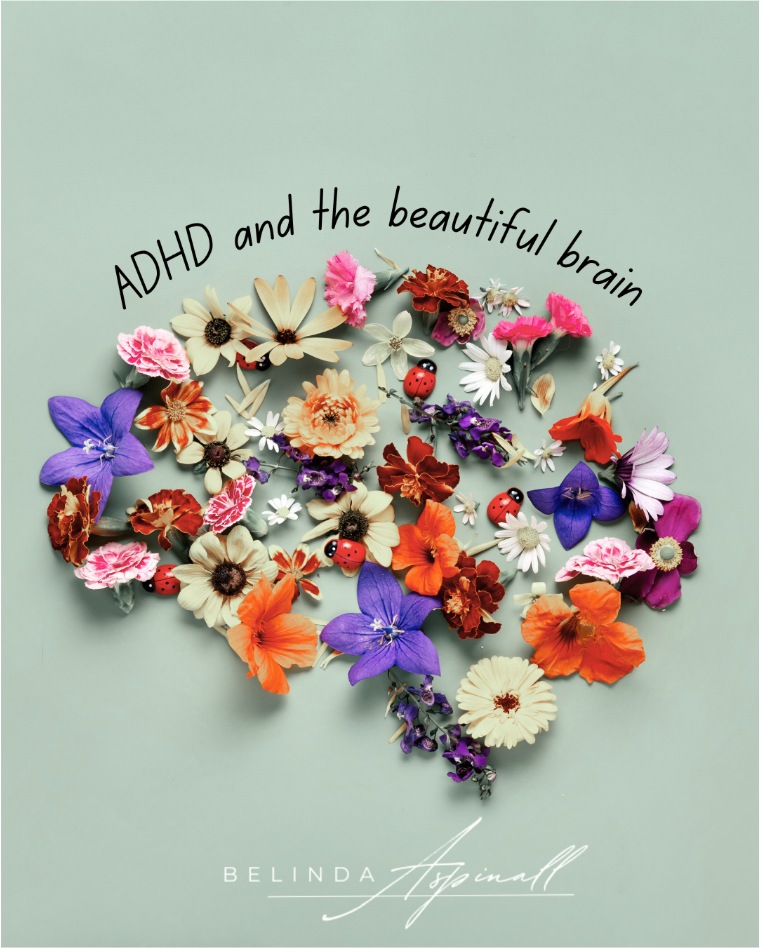ADHD and the beautiful brain - Belinda Aspinall
ADHD: What Do I Really Need to Know?
Every time I open a magazine or newspaper, I find an article about ADHD. And as I read on, I notice they tend to fall into two camps: encouraging or disparaging—rarely anything in between.
I often find myself stung by the disparaging remarks. I quickly leap to the defence of those diagnosed (formally or informally), only to remember that emotional reactivity and Rejection Sensitive Dysphoria (RSD) are part of my ADHD traits. Taking things personally? That’s just part of my package.
When I’m calmer and more measured, I can digest these articles more objectively. I read between the lines, question assumptions, and challenge them. Recently, I read a piece by Kat Brown, author of It’s Not a Bloody Trend, who advised readers to be discerning and selective about what they consume. I think this is excellent advice.
A little discernment goes a long way
Too often, we read about ‘overdiagnosis,’ ‘poor nutrition,’ ‘bad parenting,’ ‘screen time,’ or ‘lack of discipline’ being blamed for ADHD. Parents already carry so much guilt; they don’t need more piled on, no matter how erudite the author or publication.
So, I’m not going to add to the noise. I won’t debate whether ADHD is overdiagnosed, what it should be called, or whether nutrition, screen time, or parenting play a role in its symptoms. All I will say is, it is real, and there are things that you can do to help make life easier, to work with your fantastic ADHD brain.
Instead, I want to focus on something more constructive.
If there were a single solution to ADHD, you can bet it would already exist. Let’s remind ourselves how many parenting books there are—from Gina Ford to The Baby Whisperer and everything in between. There’s no one-size-fits-all approach to raising a child, and the same is true for ADHD.
There isn’t a right or wrong way to have ADHD, and you’re unlikely to find a miracle solution that changes your life overnight. But once you dig into how your brain works, you’ll discover all sorts of methods and tools. Some will work for a day, others for a month, and a few might stick with you forever.
Instead of beating yourself up for dropping a good habit or losing motivation for your new notebook, can we reframe it? Chopping and changing is part of the joy of ADHD—it’s what makes us brilliant, inspiring, and amazing.
If you’re caught in heated debates with grandparents who’ve consumed too much negative media, friends who ‘don’t believe,’ or even your inner critic, try adopting Mel Robbins’ latest mantra:
Let them. Remember, their opinions are just that—opinions.
One trick I like to use is to visualise the situation as a picture on an iPad. I zoom out, again and again, to see if the ‘battle’ I’m facing deserves my attention. Spoiler alert: it rarely does.
So, what do you need to know about ADHD? A better question might be: what do you want to know?
Who Is Belinda Aspinall
I’m a certified Children's Life Coach as well as an ADHD Life Coach. I work with clients of all ages—whether they have ADHD themselves, are parents of ADHDers, or are simply looking for support while navigating a crossroads in life.
Coaching isn’t about giving advice—it’s a partnership that helps you identify strengths, build strategies, and move toward in a way that works for your unique brain. Being ADHD-aware helps me to offer coaching in a way that truly works for you.
If you’re wondering whether coaching is right for you, please book in for a complimentary chat. I offer a complimentary chat with no pressure or sales pitch—just a chance to ask questions, explore whether coaching feels right for you, and see if we’re the right fit. I believe deeply in the power of connection, the right timing, and a coaching relationship that truly works for you so I'll never be selling coaching!
What is ADHD Life Coaching
ADHD coaching is a place to understand your unique brain, discover what works for you, and build on your strengths. It’s practical, judgment-free support for challenges like focus, time management, emotional regulation, and self-confidence—without the pressure to “fix” anything.
Whether you’re an adult navigating life, a parent supporting your child, or someone exploring ADHD for the first time, coaching provides tools and strategies to help you move forward in a way that feels right for you.
--


